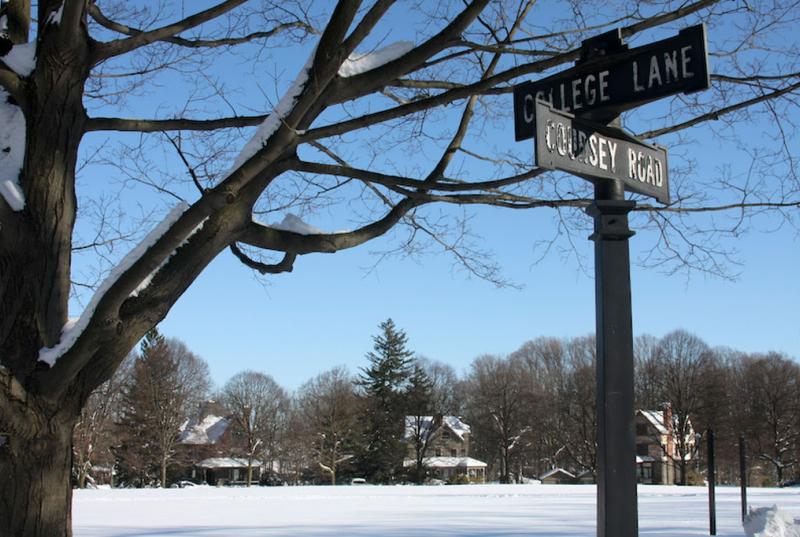By Adrian Velonis, Co-Editor-in-Chief
Haverford’s spring semester is off to a rocky start on the first day of classes. On Friday evening, students received an email from Dean Joyce Bylander announcing that the college was entering Level 3 of the Bi-Co Mitigation Plan, a set of health and safety procedures designed to limit the spread of COVID-19 on campus. The college has never gone beyond Level 2, and this change comes with several tightened restrictions on student behavior and movement.
Formerly resting safely at the default Level 1, Haverford students will now be prohibited from traveling off campus, participating in gatherings of any kind, or leaving their rooms “except to perform life-sustaining functions or for solitary outdoor activities” until at least Wednesday, February 17, when the Level 3 designation is set to expire. Commuters and Bryn Mawr students may not access the campus, and most campus facilities have been closed or restricted. However, administrators warned that this period may be extended if students do not adhere to the restrictions. In the worst case, the college will enter Level 4 of campus operations, a last resort which will send most students back home.
Since the resumption of in-person learning in the fall 2020 semester, Haverford has relied on the behavioral guidelines laid out in the Mitigation Plan to curb the spread of the virus. Ranging from Levels 1 to 4 (in order of increasing severity), the plan is intended to serve as a flexible reaction to rapidly changing health conditions within the community. Some behaviors, such as masking and social distancing, are required at all times. Others, such as group gatherings and off-campus travel, are heavily restricted only at the higher levels.
In her email, Dean Bylander cited “numerous concerns and complaints from staff, faculty, and other students about the behaviors of some members of our community,” including “Gatherings in common rooms, eating in large groups in spaces where eating is prohibited, having guests who are not members of this community, and failing to properly mask” as the reasons for the college’s move to Level 3. She stated that these actions were “unacceptable” and “put at risk our community’s health and safety.”
The quick move to Level 3 may come as a shock, but it is not the first time the college has used the Mitigation Plan to discourage certain behaviors among students. On September 13, President Wendy Raymond announced via email that the college would be moving to Level 2 because of “risky behaviors of a minority of students that threaten the health and safety of our campus community.” Such behaviors included outdoor parties, limited mask usage, and the sharing of meals. Students abided by the restrictions applied at the time, and the campus remained at Level 1 from September 20 to the end of the semester.
Similar actions were taken at Bryn Mawr on September 1, just as students were arriving on campus. At present, Bryn Mawr continues to operate at Level 1. Students there were informed of Haverford’s decision by President Kim Cassidy the same evening as the initial announcement. Cassidy stated that “since Bryn Mawr students are currently in quarantine and classes are remote for the BiCo, this does not directly impact operations at Bryn Mawr.”
Some Haverford students were surprised by the jump straight to Level 3, bypassing the more moderate restrictions that had been applied in the fall. One student, who asked to remain anonymous, stated that the campus “kind of looked like this all last semester, [so] I was a little confused. I just want to see my friends.” They quickly added, “Like, I’m still gonna follow the rules.”
The campus was quiet on Friday night, with students seemingly obeying Level 3 restrictions—at least well enough to go unnoticed. With the snow and freezing temperatures pushing students indoors, COVID-19 policy violations may be reduced in scale, but those that have persisted are less visible. Community members may anonymously fill out a form titled “Health and Safety Concerns” in order to report any such behavior to the administration.
As of the time of writing, Haverford has reported two active student cases of COVID-19 on campus out of a total of 683 tests done this semester; one on January 26, and another on February 12. One employee out of 578 tests has also tested positive for the virus on January 19. At Bryn Mawr, four positive student cases were reported on February 11. For reference, in the entire fall semester, Haverford experienced a total of 15 COVID cases, only seven of which were students; Bryn Mawr had 30, 14 of which were students.
The Pennsylvania Department of Health reports that COVID-19 diagnoses have been declining in the state since mid-December, with only 2,914 cases on February 11 compared to a peak of almost 13,000 on December 10. However, national health officials predict that full public access to the COVID-19 vaccine will not be ready until at least April, suggesting that conditions in the Bi-Co will remain similar until at least the fall 2021 semester.
Image credit: Haverford College
